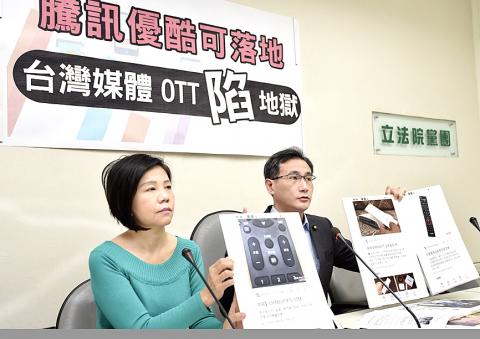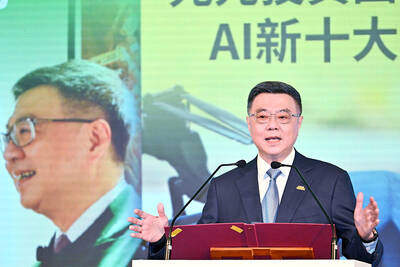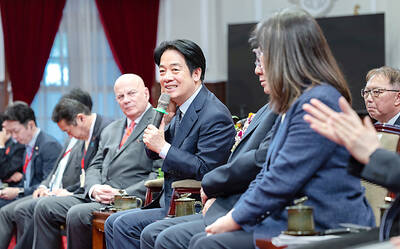Democratic Progressive Party (DPP) lawmakers yesterday called on regulators to block Chinese media corporations from establishing a foothold in Taiwan, after the Chinese-language Liberty Times (sister newspaper of the Taipei Times) reported that Tencent Holdings (騰訊) and Youku Tudou (優酷) plan to start offering local video streaming services in May.
Given free rein, Chinese state-backed media enterprises such as Tencent and Youku could corner the Taiwanese market and mold the nation’s language and culture, DPP caucus secretary-general Cheng Yun-peng (鄭運鵬) told a news conference.
“It is disconcerting that Tencent chairman Pony Ma (馬化騰) is known to walk in public wearing a [Chinese] People’s Liberation Army uniform,” Cheng said.

Photo: Chien Jung-fong, Taipei Times
“Tencent employs about 30,000 to 40,000 people, more than 7,000 of whom are also Chinese Communist Party workers,” he said.
By entering the nation’s media market, Tencent and Youku are exploiting a legal loophole that allows Chinese corporations to distribute video and audio through an agent registered in Taiwan, as online video streaming platform iQiyi has done, Cheng said.
Such content is the jurisdiction of the Ministry of Culture and not subject to the Act Governing Relations Between the People of the Taiwan Area and the Mainland Area (臺灣地區與大陸地區人民關係條例), he said.
Many of the nation’s cable companies provide their users access to iQiyi programs, which include children’s shows featuring simplified Chinese characters, he said.
“The zaoan (早安) and wan (晚) that we are used to saying are being replaced by zaoshanghao (早上好) and wanshanghao (晚上好),” he said, referring to morning and evening greetings, with the former pair being more common in Taiwan and the latter in China.
“These shows are slowly influencing Taiwanese culture and idioms,” Cheng said. “They [the companies] are not in Taiwan to make money, they are here to control the market. Think about Taiwan’s children.”
Fake social media accounts in China could be expected to use Tencent services to engage in propaganda campaigns and abuse Taiwan’s freedom of speech, he said.
In 2016, iQiyi established its Taiwanese Web site through a business agent registered as OTT Entertainment (歐銻銻), after its application to create a Taiwanese subsidiary was turned down by the Ministry of Economic Affairs.
National Communications Commission Chairwoman Nicole Chan (詹婷怡) yesterday said that the commission would today discuss the regulation of cable and Web-based streaming services with the Ministry of Culture.
The two agencies would discuss any subject pertaining to streaming platforms, including Tencent and Youku’s reported attempts to enter the nation’s market, she said.
Foreign streaming service providers have an advantage in capital over Taiwanese companies and they are aggressively expanding market share, said Chien Ta-wei (錢大衛), president of the Taiwan Over-the-Top Media Services Association and a former senior vice president of technology and licensing at TiVo.
The government should require all foreign companies to register their business agents, consumer service representatives and subsidiaries in Taiwan as a condition to provide streaming services in Taiwan, he said.
Additional reporting by CNA

Two US House of Representatives committees yesterday condemned China’s attempt to orchestrate a crash involving Vice President Hsiao Bi-khim’s (蕭美琴) car when she visited the Czech Republic last year as vice president-elect. Czech local media in March last year reported that a Chinese diplomat had run a red light while following Hsiao’s car from the airport, and Czech intelligence last week told local media that Chinese diplomats and agents had also planned to stage a demonstrative car collision. Hsiao on Saturday shared a Reuters news report on the incident through her account on social media platform X and wrote: “I

STILL ON THE TABLE: The government is not precluding advanced nuclear power generation if it is proven safer and the nuclear waste issue is solved, the premier said Taiwan is willing to be in step with the world by considering new methods of nuclear energy generation and to discuss alternative approaches to provide more stable power generation and help support industries, Premier Cho Jung-tai (卓榮泰) said yesterday. The government would continue to develop diverse and green energy solutions, which include considering advances in nuclear energy generation, he added. Cho’s remarks echoed President William Lai’s (賴清德) comments in an interview last month, saying the government is not precluding “advanced and newer nuclear power generation” if it is proven to be safer and the issue of nuclear waste is resolved. Lai’s comment had

‘BUILDING PARTNERSHIPS’: The US military’s aim is to continue to make any potential Chinese invasion more difficult than it already is, US General Ronald Clark said The likelihood of China invading Taiwan without contest is “very, very small” because the Taiwan Strait is under constant surveillance by multiple countries, a US general has said. General Ronald Clark, commanding officer of US Army Pacific (USARPAC), the US Army’s largest service component command, made the remarks during a dialogue hosted on Friday by Washington-based think tank the Center for Strategic and International Studies. Asked by the event host what the Chinese military has learned from its US counterpart over the years, Clark said that the first lesson is that the skill and will of US service members are “unmatched.” The second

STANDING TOGETHER: Amid China’s increasingly aggressive activities, nations must join forces in detecting and dealing with incursions, a Taiwanese official said Two senior Philippine officials and one former official yesterday attended the Taiwan International Ocean Forum in Taipei, the first high-level visit since the Philippines in April lifted a ban on such travel to Taiwan. The Ocean Affairs Council hosted the two-day event at the National Taiwan University Hospital International Convention Center. Philippine Navy spokesman Rear Admiral Roy Vincent Trinidad, Coast Guard spokesman Grand Commodore Jay Tarriela and former Philippine Presidential Communications Office assistant secretary Michel del Rosario participated in the forum. More than 100 officials, experts and entrepreneurs from 15 nations participated in the forum, which included discussions on countering China’s hybrid warfare